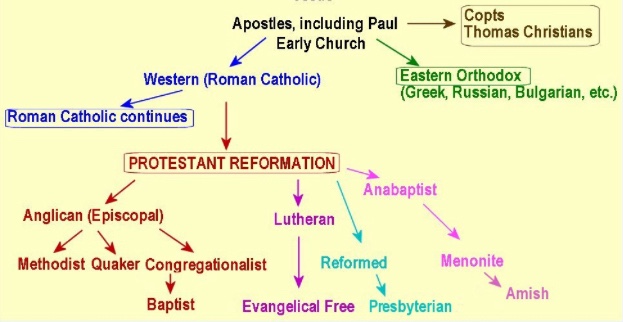Looking back at my experience as a Christian, having grown up in one of the major protestant denominations, the fact that there so many denominations has only added to the confusion of what a Christian is.
It doesn’t help that people, inherently, have a herd mentality. Congregants naturally gravitate towards protection in numbers, being affiliated with a group, and special busy work. If you attend one congregation, there’s special memories and experiences that they will identify with their life with a “church”. Yet, being a Christian is an extremely personal commitment.
Many associate being a Christian with the activities, traditions and rituals. One might break bread during Communion, another may partake of a cracker. One sings the old hymns with a choir and another sings modern gospel music off a a monitor. Here the pastor wears jeans, there they don a ritual vestment.
What is a Christian anyways?
One friend told me, when people ask if he is a Christian, before he offers them an answer, he asks them, “What does Christian mean to you?”
It’s as though the label Christian has been dragged around and manipulated by society, people do not have any kind of solid biblical and true understanding what is meant when someone asks, “Are you a Christian?”

There are number of denominations, like Methodists, Presbyterians, Lutherans, Baptists, are they different because they all believe something different? Are those differences in beliefs affect your relationship with God?
Then there’s the Catholic Church, why are they different? What about Jehovah’s Witnesses and Mormons, they recognize Jesus, are they Christians? And what about the Jews? Aren’t they actually a form of Christianity also? If it wasn’t for the Jews, there wouldn’t be half the Bible.
For the average person, you can just imagine how much confusion this world has created so that the simple message of God’s grace through the gospel is muddled.
In a way, the term Christian in modern society has lost from its true meaning.
It’s so bad that when I tag my blog posts, I stopped using the tag “Christian” or “Christianity.” I commonly tag “bible study” or “bibleperspective.”
So, no. I don’t believe that identifying oneself with a denomination has anything to do with whether someone is living a life of repentance and has given their life to the service of the Lord and Savior Jesus Christ, because that is what the gospel and the preservation of the Bible is all about: The Son of God. It’s not the annual church picnic or tithing money to you favorite non-profit, or how many rituals you can do in one day. It’s about a life that is in obedience to God through His Son, Jesus Christ.
So how does anyone really know what they are supposed to do or who the should be?
That’s is why the Bible and the authority given to it as the inspired and inerrant Word of God is critical. It’s more critical than what many churches have treated the Bible. Without the Bible held up as an authority, the resulting confusion is only something satan would enjoy.

Think about it, the reason why we have Christianity is because of Jesus Christ and the source of knowledge that we from the first generation eye witnesses have that has been miraculously preserved are the four Gospels. The New Testament includes the Book of ACTS, which tells about the beginning of Church history during the time of the apostles including the miraculous addition of the Apostle Paul. The final book of the New Testament, Revelation, was written about 95 A.D by the Apostle John, the last surviving Apostle and one the the inner realm of Christ’s disciples.
I can tell you looking back at my life, even looking back at the impact my military service had on me 40 years ago, it takes some maturity, time and reflection to gather the essence of what had occurred, yet the memories are still quite clear. However, I am not an Apostle who was blessed with the powers that only the Apostles would have been given. Even the Apostles had the power to heal in ways that Jesus did, but given in measure to their faith, and by the will of God. The Apostle John was given the prophetic visions by God in a way that no one else could have.
Everything that was needed to begin to grow the Body of Christ (the Church) as determined by the teachings of Jesus Christ occurred in the First Century between about 30 AD and 95 AD. That’s only about 60 years. Going back to the Bible and understanding it for yourself is like going back to the very first person in the game of telephone operator.
It’s not the Bible that has changed since the First Century. Yes, there are many versions, but they are, for the most part, faithful translations and without flagrant or malicious attempts to alter the meanings of original writings.
The problem is not with the Bible, it’s how the different churches from their pulpits have taken liberties to teach only parts of it or to mislead their congregants to all of the truths found it in.
The book of Revelation contains the stern warning by Jesus through John’s writing:
18 For I testify to everyone who hears the words of the prophecy of this book: If anyone adds to these things, God will add to him the plagues that are written in this book; 19 and if anyone takes away from the words of the book of this prophecy, God shall take away his part from the Book of Life, from the holy city, and from the things which are written in this book. -Revelation 22:18-19

The eye witness accounts of something as impactful as Jesus’ supernatural life and the retelling of the stories many had witnessed — for the authors to write their gospels as early as 50 A.D., that is not a long period of time.
In other words, the fact that the gospels were written with information corroborated by first hand witnesses adds immensely to the authenticity. One must also keep in mind that these apostles and those who wrote, God expressed Himself through the Holy Spirit to these writers who were also closely related to the first hand experiences of Jesus’s ministry.
Having said that, how people have interpreted the Holy Scripture, like the Pharisees of Jesus’ time and their interpretation of the Law of Moses and the Old Testament Prophets, can be entirely off the mark when it is read with worldly biases. People and institutions have selectively highlighted some passage while ignoring large swaths to promote a self-interest agenda.
Regardless of your Church denomination, the Bible ought to be gleaned for its personal applications on a daily basis. The Bible should be read as Truth and a personal window to understand the unfathomable grace and off-the-charts magnificence of a Holy Creator God. Even if some parts are difficult to understand, do not disregard, take some notes and do some research or consult with other Bible scholars or enthusiasts. Read prayerfully, read humbly, read expectantly, read diligently.
Some info on which writings compose the Bible, according to gotquestions.org
The first “canon” was the Muratorian Canon, which was compiled in AD 170. The Muratorian Canon included all of the New Testament books except Hebrews, James, 1 and 2 Peter, and 3 John. In AD 363, the Council of Laodicea stated that only the Old Testament (along with one book of the Apocrypha) and 26 books of the New Testament (everything but Revelation) were canonical and to be read in the churches. The Council of Hippo (AD 393) and the Council of Carthage (AD 397) also affirmed the same 27 books as authoritative.
There are some who question the validity of the Holy Canon because some scriptures were left out, to which one is free to explore. Key questions to keep in mind when investigating non-canonical literature are the criteria used by the church leaders below:
“The councils followed something similar to the following principles to determine whether a New Testament book was truly inspired by the Holy Spirit: 1) Was the author an apostle or have a close connection with an apostle? 2) Is the book being accepted by the body of Christ at large? 3) Did the book contain consistency of doctrine and orthodox teaching? 4) Did the book bear evidence of high moral and spiritual values that would reflect a work of the Holy Spirit?” (Ref: got questions.org).

Through most of my life, I was distracted with many worldly biases that interfered with my understanding of Scripture. Once I surrendered my life Jesus as Lord, I discovered the Bible to be incredibly clear when it comes to understanding the Truths about God, the purposes of the Israelites, and the life, teachings and the gospel of Jesus Christ.
***
For a detailed explanation of who Jesus Christ is from the Bible’s perspective go to the video in this website , “Who is Jesus Christ?”
CKY
***
Copyright © 2023 ChallenYee.com Some Rights Reserved
